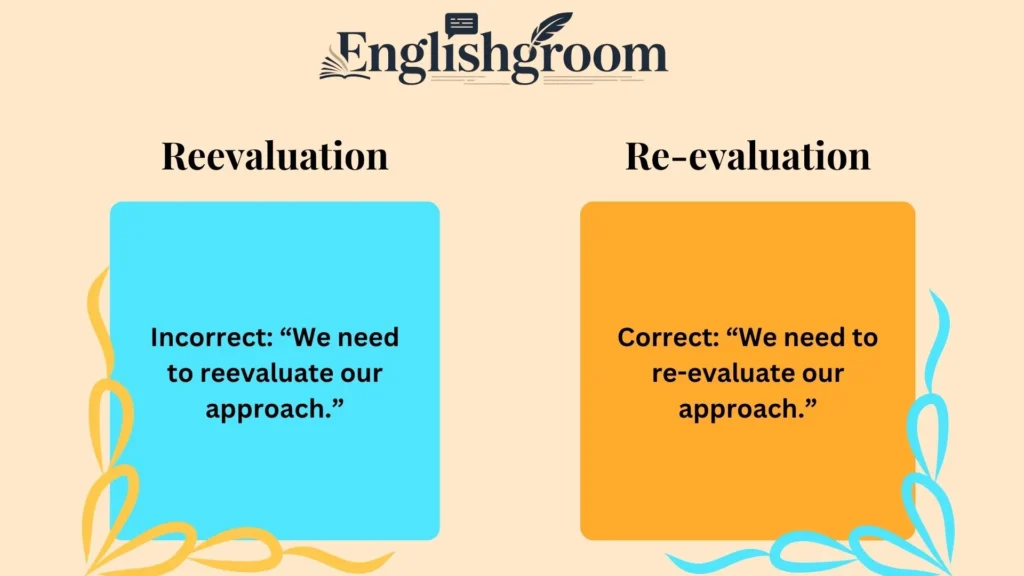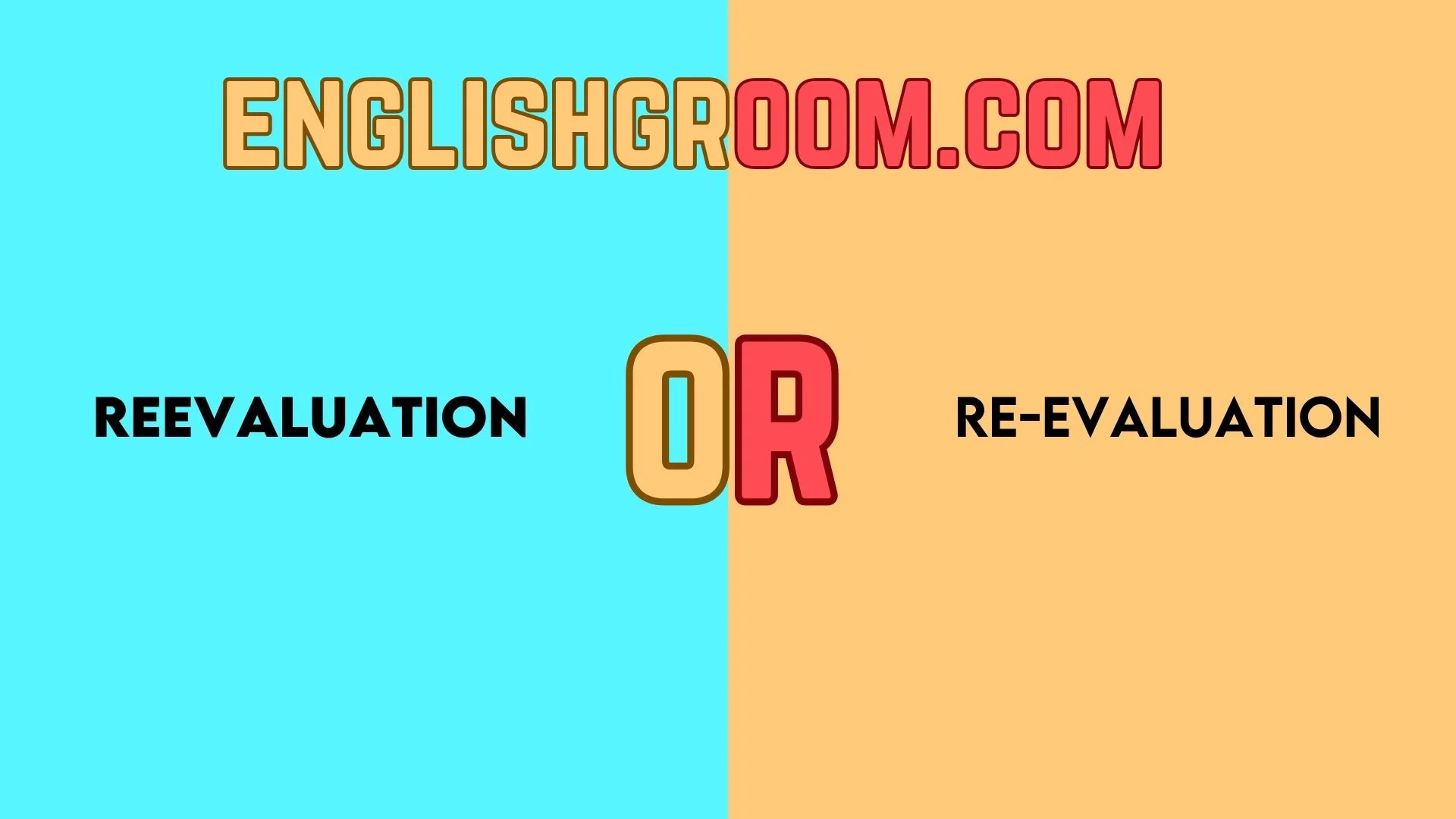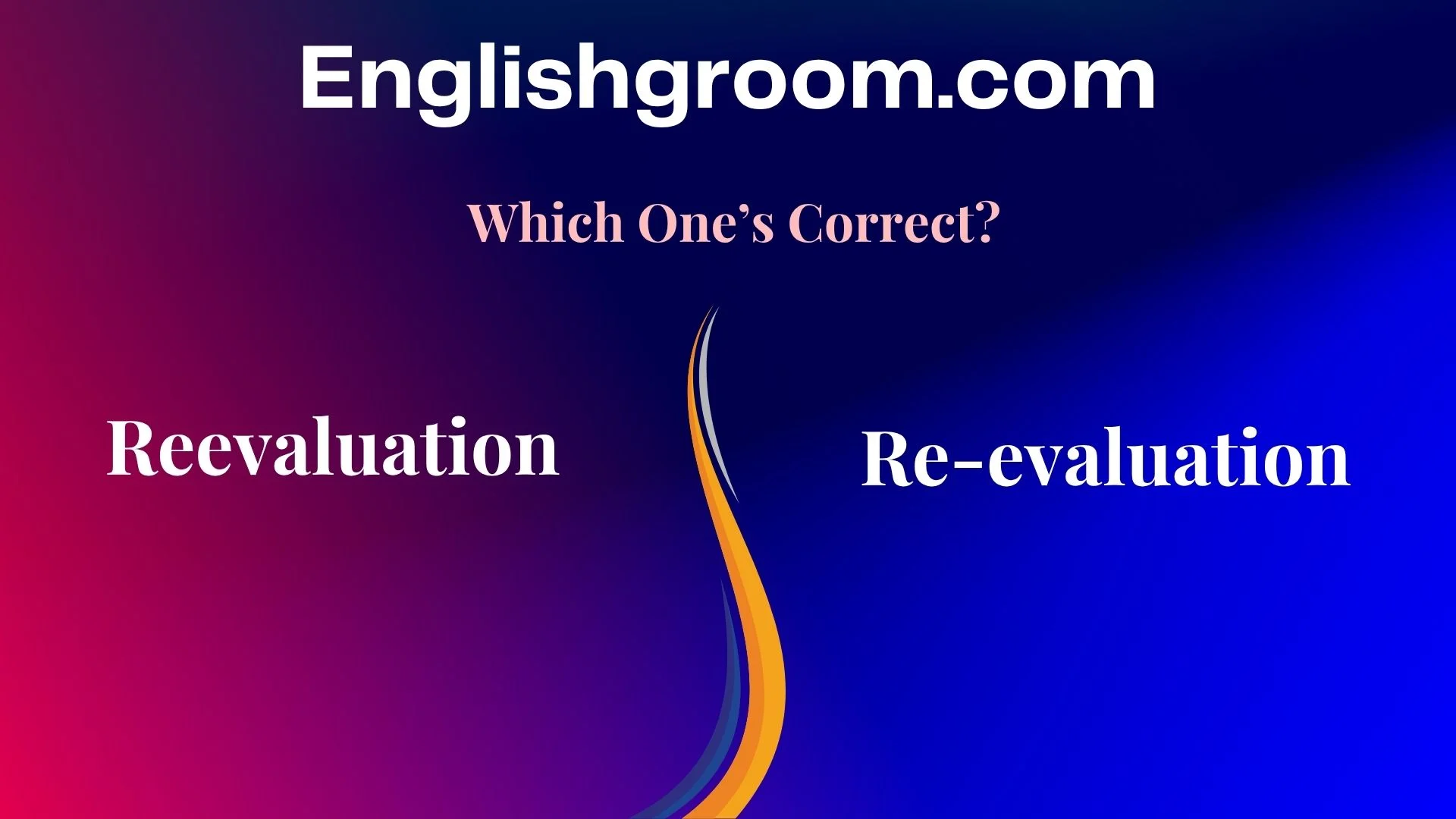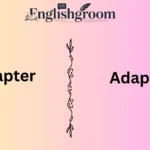English can be tricky sometimes. You might type “reevaluation” one day and “re-evaluation” the next—then pause, wondering which one’s actually correct. The truth is, both versions exist. But one is far more accepted in American English, while the other has stronger roots in British usage.
This guide will walk you through the real rules, style guide recommendations, and linguistic logic behind Reevaluation vs Re-evaluation—no fluff, no confusion.
Understanding Hyphenation in American English
Hyphenation once followed rigid, almost old-fashioned rules. But language evolves, and so does punctuation.
Why Hyphens Exist
Hyphens were originally used to connect compound words, make reading easier, and clarify meaning. They helped avoid confusion in cases like:
- “re-sign” (sign again) vs “resign” (quit)
- “co-op” (a cooperative) vs “coop” (a cage for chickens)
As time passed, many compound words fused into single, closed forms. Words like “email,” “cooperate,” and “reelect” dropped their hyphens because readers no longer needed the visual cue.
Modern Hyphenation Trend
Most modern American writing favors simplification. The Associated Press (AP), Chicago Manual of Style (CMOS), and Merriam-Webster Dictionary all push for fewer hyphens unless they’re needed for clarity.
Fact: In 1900, more than half of English compound words contained a hyphen. Today, fewer than 20% do.
The Prefix “Re-”: A Special Case
Prefixes like “re-” cause constant confusion because they can completely change meaning depending on context.
What “Re-” Means
The prefix re- means “again” or “back.” For instance:
- Rebuild = build again
- Return = come back
When It Gets Tricky
The trouble starts when the base word begins with the same vowel—especially “e.” That’s when writers pause: Should I add a hyphen to make it easier to read?
Take a look:
| Prefix + Word | With Hyphen | Without Hyphen | Meaning |
|---|---|---|---|
| re + elect | re-elect | reelect | choose again |
| re + enter | re-enter | reenter | enter again |
| re + evaluate | re-evaluate | reevaluate | assess again |
The last example—reevaluate vs re-evaluate—is where most people stumble.

When to Use a Hyphen with “Re-”
A hyphen is useful when it prevents confusion or changes meaning.
Use a Hyphen When:
- The word’s meaning changes without it.
- “re-cover” (cover again) ≠ “recover” (get better)
- The base word begins with the same vowel (“e” or “o” especially).
- “re-enter,” “re-edit,” “re-evaluate”
- The unhyphenated version looks awkward or hard to read.
- “reeeducate” vs “re-educate”
- The word isn’t widely recognized in closed form.
Examples
- Correct: “She’ll re-enter the competition next year.”
- Correct: “We need to re-evaluate our approach.”
- Incorrect: “We need to reevaluate our approach.” (Unless following US style guides—more on that soon.)
When Not to Use a Hyphen
Here’s the modern rule of thumb in American English:
Avoid hyphens unless their absence creates confusion.
Skip the Hyphen When:
- The word is commonly closed in dictionaries.
- The prefix doesn’t alter the meaning.
- The result is clear and readable without it.
Examples:
- “reelect,” not “re-elect”
- “reapply,” not “re-apply”
- “reopen,” not “re-open”
Why? Because American English streamlines compounds over time, eliminating unnecessary punctuation.
Reevaluation vs Re-evaluation: The Core Debate
This is where things get interesting.
| Variant | Usage | Common In | Style Guide Preference |
|---|---|---|---|
| Reevaluation | Modern, simplified | American English | AP, APA, Chicago |
| Re-evaluation | Traditional | British English | Oxford, Cambridge |
What Dictionaries Say
- Merriam-Webster lists “reevaluation” as the primary spelling.
- Oxford English Dictionary (OED) prefers “re-evaluation.”
- Cambridge Dictionary recognizes both but leans toward “re-evaluation.”
Quote: Merriam-Webster: “The hyphen is often omitted when no ambiguity exists, particularly in American English.”
Real Usage Data
Using Google Ngram Viewer, “reevaluation” appears nearly four times more often in American publications since 2000. British publications show the opposite trend.
Style Guide Recommendations
Each major writing authority has its own take, but they largely agree on one thing—simplicity wins.
| Style Guide | Preferred Form | Notes |
|---|---|---|
| APA (7th ed.) | Reevaluation | No hyphen unless ambiguity occurs |
| Chicago Manual of Style (17th ed.) | Reevaluation | Hyphen optional for clarity |
| Associated Press (AP) | Reevaluation | Avoid hyphens unless necessary |
| MLA | Reevaluation | Consistent with US dictionary usage |
| Oxford Style Manual (UK) | Re-evaluation | Hyphen retained for tradition |
Quick Tip
If you’re writing for an American audience, use reevaluation.
If your readers are British, stick with re-evaluation.
When Context Demands the Hyphen
Even in the US, certain contexts still favor the hyphen for precision.
Legal Writing
Legal documents demand clarity. If a missing hyphen could shift meaning, lawyers will use one.
Example:
“The court ordered a re-evaluation of evidence.”
Here, the hyphen ensures that the reader doesn’t confuse “reevaluation” with another term or misread the compound.
Academic and Technical Writing
Academia leans conservative. Many university style guides still prefer re-evaluation, particularly in research papers, dissertations, and government publications.
Corporate Communication
Corporate writers usually follow AP or Chicago style, which support reevaluation. However, readability always takes precedence.
The Risk of Dropping Hyphens
Omitting hyphens might seem harmless—until it leads to a costly misinterpretation.
Case Study: Misinterpretation in Policy Writing
A policy document once stated:
“All employees must re-sign contracts annually.”
It caused panic. Some thought it meant resign (quit their jobs).
The intended meaning? “Re-sign,” as in sign again. One missing hyphen almost triggered resignations!
Case Study: Academic Misunderstanding
A psychology paper used “reevaluate” inconsistently with “re-evaluate.” Reviewers flagged it as careless editing, lowering its credibility score. Consistency matters, even in small details.
Capitalization and Hyphenation in Titles
When writing titles or headings, both readability and style guide rules apply.
Title Case Examples
| Correct | Incorrect |
|---|---|
| Reevaluation of Company Policies | Re-evaluation of company policies (lowercase “e” after hyphen in title case is inconsistent) |
| Re-evaluation of Ethics in AI | Reevaluation of Ethics in AI (depends on target audience) |
Tip: Avoid awkward line breaks on hyphenated words in titles—they look messy in digital formats.
Best Practices for Writers and Editors
Before deciding whether to hyphenate, run through this 3-step checklist.
1. Check the Dictionary
Always start with Merriam-Webster or APA style references for American writing. If the dictionary lists the closed form, use it.
2. Apply the Ambiguity Test
Ask: Could this word be misread without the hyphen?
If yes, keep the hyphen.
Example:
- “Re-cover the sofa” (cover again) vs. “Recover the sofa” (get it back)
3. Match Your Style Guide
Follow your organization’s or publication’s style manual. Inconsistent hyphenation signals sloppy writing.
Quick Reference Table
| Situation | Preferred Form | Example |
|---|---|---|
| Everyday American English | Reevaluation | “Let’s start a reevaluation process.” |
| British English | Re-evaluation | “The report calls for a re-evaluation of strategy.” |
| Legal or Academic Writing | Re-evaluation | “The court ordered a re-evaluation.” |
| Informal Writing | Reevaluation | “I’m in the middle of a personal reevaluation.” |

FAQs about Reevaluation vs Re-evaluation
What’s the main difference between “reevaluation” and “re-evaluation”?
They mean the same thing. The only difference is spelling convention. “Reevaluation” dominates in American English, while “re-evaluation” remains standard in British English.
Which spelling do style guides like APA or AP prefer?
Both APA and AP favor reevaluation without the hyphen, aligning with Merriam-Webster’s dictionary.
Is it ever wrong to use the hyphen?
No, it’s not “wrong.” It’s simply less common in the US. Use it if it improves readability or matches your audience’s expectations.
Why do British and American English differ here?
British English tends to preserve traditional forms longer, including hyphenation. American English simplifies over time for ease of use.
What’s the safest rule to follow?
If you’re writing for an American audience, go with reevaluation. If your readers are international or British, re-evaluation feels more natural.
Conclusion: The Verdict on Reevaluation vs Re-evaluation
So, which one’s correct? Both—but context decides.
In modern American English, reevaluation (no hyphen) reigns supreme. It aligns with most dictionaries, style guides, and common usage trends. Re-evaluation, on the other hand, continues to hold ground in British and academic contexts.
When in doubt, follow three simple rules:
- Check your dictionary.
- Avoid confusion.
- Be consistent.
Language evolves, and so do writing norms. Whether you choose reevaluation or re-evaluation, the goal stays the same—clarity, credibility, and comprehension.

Hi! I’m Sami, a 28-year-old content writer with a love for words and storytelling. Writing has always been my way of expressing ideas, sharing knowledge, and connecting with people. I enjoy creating engaging and well-researched content—whether it’s blogs, articles, or social media posts—that not only informs but also inspires readers. My goal is to turn complex ideas into clear, creative, and meaningful pieces of writing that leave a lasting impact.



